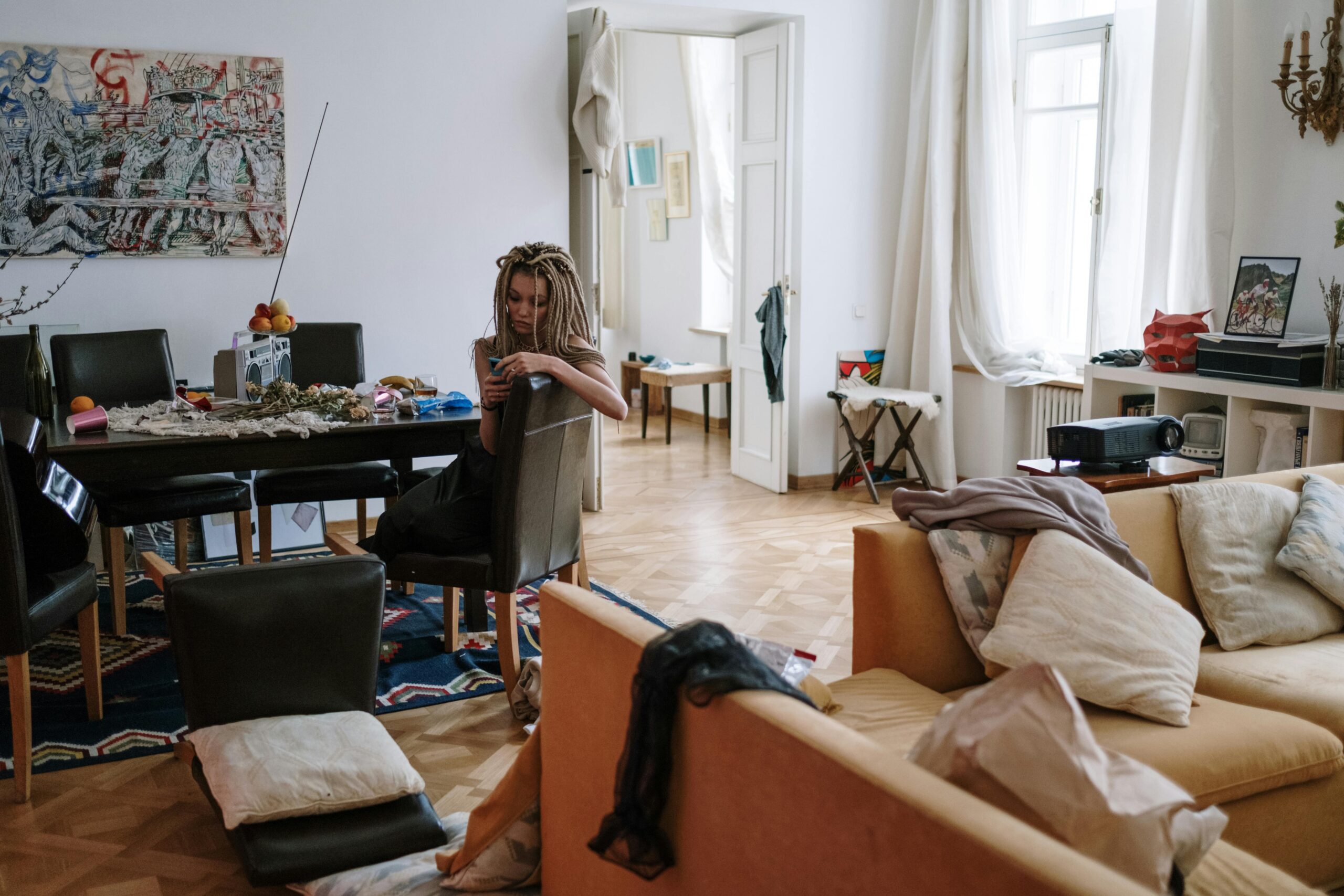Article written by Denver therapist, Lauren Battista
Picture this: You walk into your home after a long, chaotic day.
The counters are littered with cups and plates, papers and documents pile high on the coffee table, unread books clutter the side tables, and blankets sprawl across the sofas.
To top it off, you step over a spilled dog water bowl just to drop your work bag onto the only clear surface you can find—a kitchen chair. Stressful, right?
Now, imagine this alternative. You step into the same home after the same long day, but this time, the counters are clear.
Your papers and documents are neatly stored in designated folders out of sight. The books are stacked neatly, blankets folded into a basket, and the dog’s water bowl sits tidily in the mudroom.
You hang your bag on a hook by the wall. Instantly, you feel a sense of calm and ease.
Which scenario feels better? For most of us, the second option is a clear winner. The reason? Clutter doesn’t just crowd your space; it crowds your mind, too.
The Mental Toll of Clutter
Our brains are wired to seek order. When surrounded by clutter, they must work overtime to filter out the excess “noise” in our environment.
This constant mental effort leads to stress, fatigue, disorganization, decreased productivity, and even feelings of overwhelm.
Studies show that visual clutter increases the stress hormone cortisol, contributing to a heightened state of fight-or-flight.
But it’s not just about stress.
Clutter impacts many areas of mental well-being:
- Mental fatigue: Your brain expends extra energy ignoring visual chaos, leaving you drained.
- Mood: Clutter may increase feelings of depression and anxiety. Decluttering releases dopamine, the “happy hormone,” instantly boosting your mood.
- Sleep: Sleeping in an uncluttered room is linked to fewer sleep disturbances that impact your mental health.
- Focus: A clutter-free space reduces overstimulation, especially for those with symptoms of ADHD, improving focus and productivity.
- Stress reduction: Simply being in an organized environment can lower anxiety levels and help you feel more grounded and reducing stress levels.
The Impact of Clutter on Mental Health: What the Research Says
Numerous studies highlight the connection between clutter and mental health:
- Research from Princeton University Neuroscience Institute discovered that physical clutter in your surroundings competes for your attention, decreasing your ability to focus and process information efficiently.
- A 2017 study in Current Psychology revealed that people living in cluttered spaces were more likely to experience feelings of depression and fatigue. The researchers emphasized that cluttered environments can contribute to a lack of motivation and overall dissatisfaction with life.
- A 2020 survey by the National Association of Productivity and Organizing Professionals found that 91% of respondents reported feeling more productive and less stressed in a clutter-free space.
- Clean and tidy environments are also associated with greater feelings of mental clarity and self-control. A study published in Psychological Science found that participants in organized spaces made healthier food choices and demonstrated improved decision-making skills compared to those in cluttered environments.
Connection Between Clutter and Decision Fatigue
Based on the study findings above it makes sense that clutter leads to decision fatigue by creating a sense of overwhelm. When surrounded by too many items, your brain struggles to prioritize and make choices.
This can result in:
- Difficulty focusing on tasks.
- Increased stress levels as you attempt to “sort through” the visual chaos.
- Impulsive or poor decision-making as mental energy is depleted.
- Decrease in mental clarity
- Discomfort being in your living environment
A decluttered environment simplifies your decision-making process, conserving mental energy for more meaningful choices.
Decluttering May Lead to Improvement in Relationships
A clutter-free space can also improve relationships at home.
Here’s how:
- Reduced Arguments: A tidy environment can minimize conflicts about chores or responsibilities.
- Shared Ownership: Involve everyone in the decluttering process to create a sense of teamwork and shared accountability.
- Setting Expectations: Clearly communicate the goals of decluttering with children, teens, or partners to ensure everyone is on the same page.
- Emotional Benefits: A harmonious living space and physical environment fosters stronger emotional connections and can reduce tension.
Decluttering Your Space, One Habit at a Time
Decluttering doesn’t have to be overwhelming. By adopting small, intentional habits, you can transform your home—and your mind—over time.
Here are some decluttering micro-habits to consider:
- One In, One Out
For every new item that enters your home, remove one that you no longer need. Donate or toss it to keep your space balanced.
- 5-Minute Tidy-Up
Set aside five minutes each morning and evening to tidy up. This simple habit prevents clutter from piling up and keeps your home in order and free of mess.
- Make Your Bed
Starting your day with a made bed instantly makes your room look tidier and sets the tone for a productive day. Plus, it gives you a quick win right off the bat.
- Run the Dishwasher at Night
Avoid letting dishes pile up by running your dishwasher before bed. Waking up to a clean kitchen can set a positive tone for your day. Consider setting a 5-minute timer to make this process less daunting at first.
- Everything Has a Home
Assign a designated spot for every item in your home. After using something, return it to its “home” to avoid unnecessary clutter. Bonus tip: Use a label maker to make organization easier.
- Toss One Item Per Day
Removing just one item daily can clear over 365 items from your home in a year. Small changes add up!
- One Small Area Per Week
Focus on organizing one small area, like a drawer or a shelf, each week. Over time, this transforms your entire space, and you can use a similar strategy by setting a timer to ensure this process is clear and concise for your brain.
- Ask Yourself: Does It Bring Me Joy?
If an item does not bring you joy or serve a clear purpose, it’s time to let it go. Create a donate or toss pile and act on it.
Tips for Sustainable Decluttering for Better Mental Health
Decluttering doesn’t have to be wasteful.
Here are some environmentally friendly ways to declutter:
- Donate: Give items in good condition to local charities or shelters.
- Recycle: Properly dispose of items that can be recycled, like old electronics, paper, and glass.
- Community Swaps: Organize or participate in community swap events to exchange items you no longer need for something you’ll use.
- Upcycle: Get creative by repurposing old items into something new and functional.
- Sell: or give away unused items on facebook marketplace or other social media platforms or have a garage sale.
Digital Decluttering for Mental Wellbeing
Feeling overwhelmed due to clutter surrounding us isn’t limited to physical spaces. Digital clutter can also weigh on your mental health.
Try these strategies to consider decluttering your digital spaces as well:
- Organize Emails: Unsubscribe from newsletters you don’t read and create folders for important emails.
- Delete Unused Apps: Free up space on your devices by removing apps you no longer use.
- Streamline Your Desktop: Keep only essential files and folders on your desktop to reduce visual clutter.
- Clean Up Photo Libraries: Delete duplicate or unnecessary photos and organize the rest into albums for easy access.
Support Your Mental Health: Ask For Help if You Could use some
- Ask a friend or partner to keep you company and hold you accountable
- Consider a professional organizer or coach
- Talk with a mental health professional who can help you uncover blocks to removing clutter that can lead to significant impacts like chronic stress and anxiety.
The Benefits of a Simplified Life
Decluttering your home is about more than just aesthetics. It’s about creating a space that supports your best self. When your environment is organized, you feel lighter, calmer, and more in control.
You free up mental energy to focus on what truly matters, whether that’s spending time with loved ones, pursuing hobbies, or simply enjoying your space.
Remember, small habits lead to big transformations.
Start small: clear one surface, toss one thing, or organize one drawer.
You’ll be amazed at the difference it makes—not just in your home, but in your mind.
Declutter your space, declutter your life. Clear space, clear mind.
To get started in supportive therapy, contact us today!
***

Denver Therapist, Lauren Battista
Denver therapist Lauren Battista enjoys working with clients (and herself) in finding supportive ways to improve mental wellbeing.
Through her training and experience supporting others (and herself:)) she has learned the power of taking things one step at a time.
Decluttering may sound simple; and those who struggle with cluttered spaces, understand how overwhelming the idea of decluttering can be.
Lauren gets it and she can support you in your journey to a clearer space, clearer mind.
Lauren specializes in trauma, anxiety, depression, ADHD, relationships and life transitions.
Her approaches to therapy include EMDR therapy, Brainspotting, Acceptance and Commitment Therapy (ACT), Dialectical Behavioral Therapy (DBT), Cognitive Behavioral Therapy (CBT) and Internal Family Systems (IFS).
Lauren understands that one size doesn’t fit all and she takes the approach to supporting her clients according to their needs and desires.

